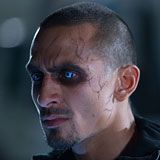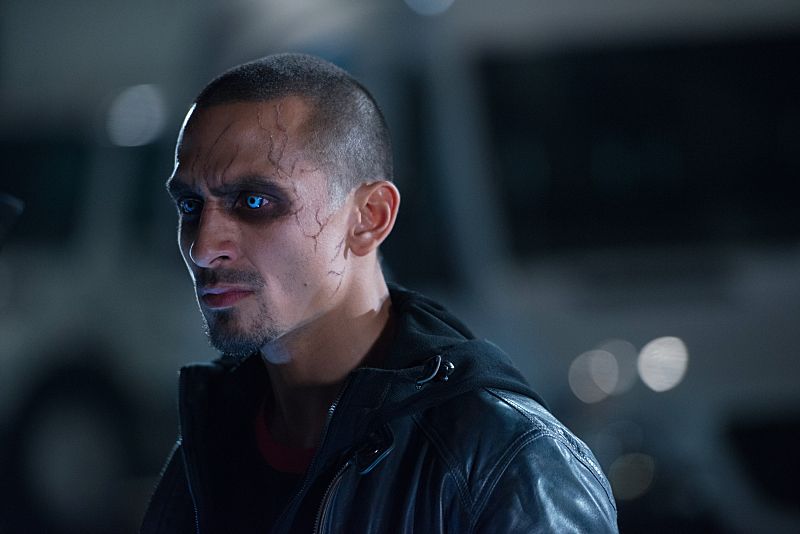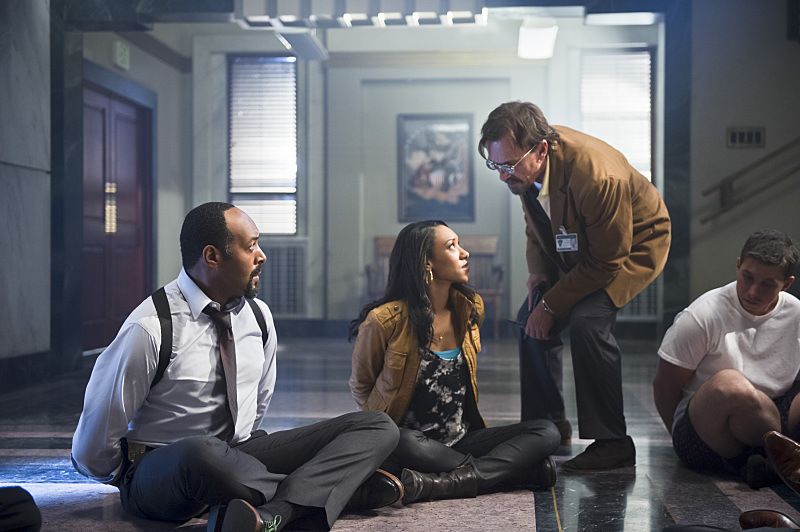Talk about spinning plates: This week’s episode of The Flash featured the introduction of a new villain, a return of last week’s antagonist, the participation of an established Arrow foe and part of what could be the origin of one the Scarlet Speedster’s greatest rogues. That’s a lot of villainy in one 44-minute episode, so let’s break it down.
“Power Outage” begins with the introduction of Blackout, aka Farooq, who never actually appeared in the DC Universe proper. He was introduced in DC Comics’ Flashpoint, but he’s yet to make his New 52 debut. But here he is on television, and for a character with little to no DC Comics history, he sure gave Barry Allen a hard time.
Last week, I gave The Flash props for making its villains more than mere freaks of the week. Power- and appearance-wise, Farooq very much resembled a hastily realized Smallville foe, but “Power Outage” made up for that by delivering a relentless story that took all of the elements that have made The Flash special and shook them up in such a way that this episode stands out as one of the finest to date.
Through a prologue flashback, Farooq is established as a goodhearted young man who climbed a power station to watch Harrison Wells’ fateful experiment. When the particle accelerator exploded, Farooq – whose first concern was for his friends -- is transformed into an energy vampire. No longer worried about the well-being of others, Blackout quickly runs afoul of The Flash in a series confrontations with an aesthetic I wish the Spider-Man/Elektro battles in The Amazing Spider-Man 2 possessed. Considering the relatively limited television budget, The Flash producers did a terrific job of of making a potentially generic villain seem like a serious threat. In fact, Farooq went so far as to drain Barry of his powers, kicking off the real drama of the episode.
Blackout isn’t merely a threat to Barry’s powers but to Harrison Wells’ life and outlook as well. He blames Wells the curse that made him hunger for energy, as well as for the deaths of his two friends, who were killed while performing CPR on the scientist after the accident. Blackout wants to punish Wells, whom he views as callous scientist who doesn’t regret his actions. Wells surprises Blackout by responding not only with the names of his dead friends but a list of all those affected by the accident -- a roll call that should make old-school DC fans swoon. Included in the tally are Ralph Dibny (Elongated Man), Al Rothstein (Atom Smasher), Will Everett (Amazing-Man), Grant Emerson (Damage), what I think was Beatriz da Costa (Fire; sorry, Wells kind of mumbled the last one)and Ronnie Raymond (Firestorm). If even half of those names appear in future episodes.
Blackout drains Barry and then arrives at STAR Labs to take down Wells. Of course, Barry is basically helpless because of his power loss, but this isn’t the only crisis in Central City: At the police precinct William Tockman, the Arrow villain known as the Clock King, takes Detective West and Iris hostage, along with a number of Central City’s finest, driving home just how much the city needs The Flash. Eddie Thawne is shot trying to take down the Clock King, and the Wests have to figure out a way to stop the villain in time to save the young detective’s life. This segment is nearly as riveting as the scenes with Blackout, with nary any superpowers involved. For the second week, it’s Iris West who stops bad guy, proving she’s no helpless hostage.
Back to STAR Labs, Wells, Cisco and Kaitlin race to restore Barry’s powers while Blackout hunts Wells. Team Flash desperately tries to shock Barry’s powers back using the treadmill. To distract Blackout, Wells releases Girder – Barry’s childhood tormenter turned metahuman -- to subdue the new electrical menace. When Barry revealed his identity to the imprisoned Girder, we knew the show eventually would have to tie up that loose thread, and it turned out to be sooner rather than later: Girder died heroically fighting Blackout. This creates a philosophical rift between Barry and Wells, one that seemingly will resonate moving forward.
Girder’s intervention gives Barry’s cells time to recharge, but the young hero’s confidence betrays him once again. Knowing Iris and his STAR Labs comrades are in danger, Barry kickstarts his powers, but this time, they’re off the charts -- we’re talking Bronze Age, godlike speed that makes Blackout’s lightning seemingly stand still. Barry draws Blackout’s powers into his own, killing Farooq in the process. We also get a look at how important Barry is to the future, as after Blackout steals the young hero’s powers, that fateful , futuristic newspaper headline -- you know, the one from the pilot containing the word “Crisis” -- has changed. Wells grows obsessed with restoring the future to the way it’s supposed to be. These teases remain enigmatic, but they grow ever more intriguing with each episode. Where’s Rip Hunter when you need them, or Booster Gold for that matter?
So, Girder and Blackout are dead and Clock King in custody, and both Barry and Iris can stand proud in their victories over villainy. Once again, all is right in Central City, except for the yellowish blood sample Wells takes from the corpse of Blackout, which holds the secrets of absorbing Barry’s speed.



